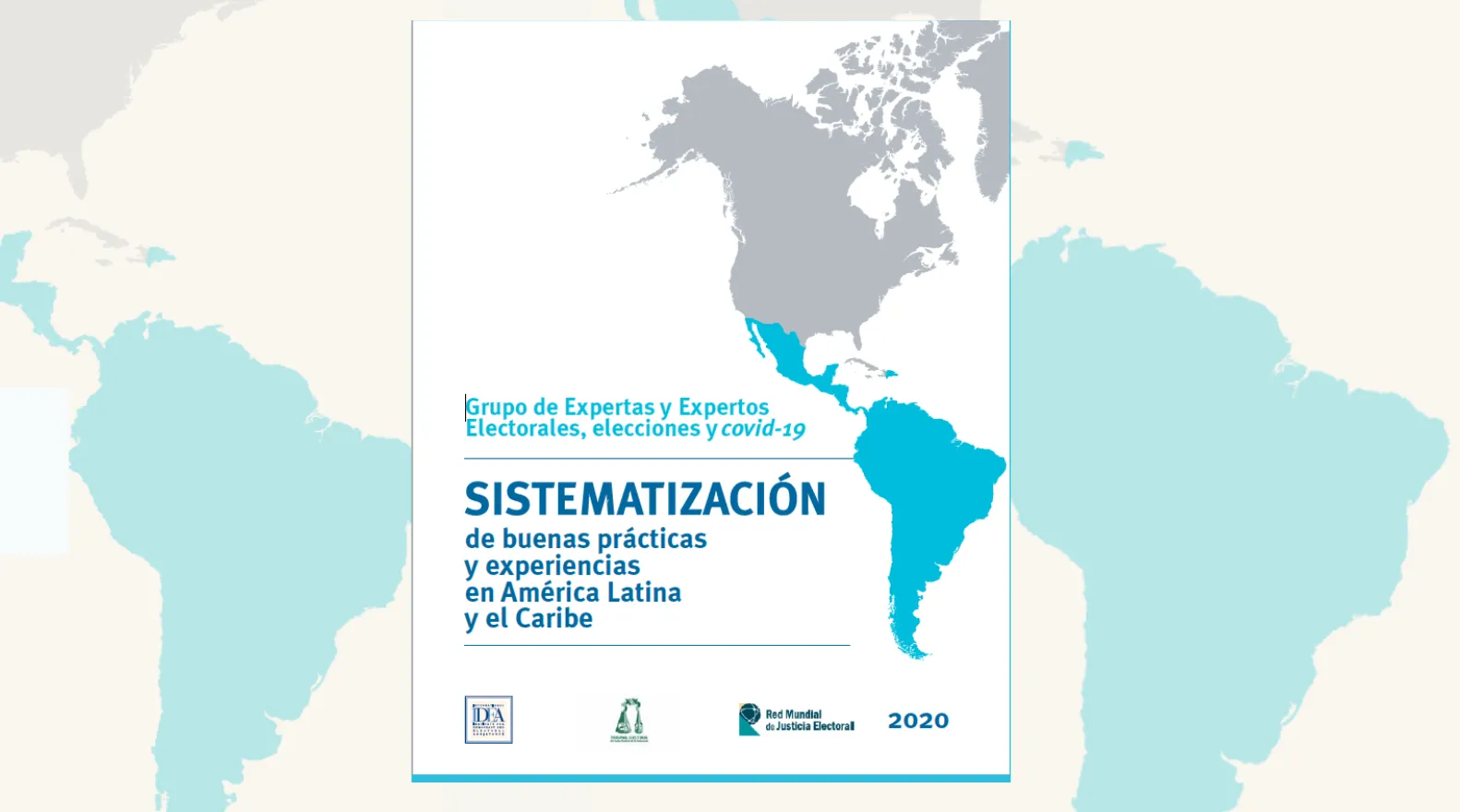Group of Latin American Authorities and Experts: Elections and Covid-19

What has happened to elections in Latin America in the context of the Covid-19 pandemic? How have the electoral management and judicial bodies faced the various challenges of the health crisis? Which best practices and lessons have been implemented to defend democracy in the region? These are some of the questions raised by the Group of Electoral Authorities and Experts: Elections and Covid-19, an initiative of International IDEA, the Mexican Electoral Tribunal of the Judiciary of the Federation (TEPJF) and the Global Network of Electoral Justice.
Este artículo está disponible en español.
Due to Covid-19, 10 of the 16 elections scheduled in Latin America for 2020 were postponed. While, for the most part, Latin American countries are taking the necessary health measures to control the pandemic, it is of crucial importance to ensure political and voting rights are safeguarded. The crisis has not only forced governments to make political and electoral decisions assertively, but also to act considering the social, economic and political impact. The democratic and electoral future of the region depends on how this situation is addressed, both at the national and regional levels. Hence, it becomes a priority to build spaces and mechanisms of cooperation and coordination to strengthen the regional capacity to face the crisis.
The group of electoral experts is a space for dialogue and exchange of good practices and recommendations. It collects the experiences of various Latin American countries on how to address elections in the context of the Covid-19 pandemic. Furthermore, its main purpose is to gather proposals and knowledge from the Latin American perspective for electoral authorities to use them as tools for decision-making.
Group of Electoral Authorities and Experts’ Meetings
Since 5 May 2020, representatives of regional electoral bodies and electoral experts from different countries—Argentina, Brazil, Bolivia, Chile, Colombia, Costa Rica, Dominican Republic, Ecuador, El Salvador, France, Guatemala, Honduras, Mexico, Panama, Paraguay, Peru, Spain, Uruguay, Venezuela and United States—have participated in the meetings. Throughout 18 sessions, the group has focused on the following topics:
- Overall analysis of the situation in Latin America (5 May 2020).
- Technology and electoral processes (19 May 2020).
- The role of electoral justice in the face of Covid-19 (5 June 2020).
- Alternative voting modalities and mechanisms: differences, pros and cons (19 June 2020).
- Electoral justice: analysis of Covid-19-related court proceedings (2 July 2020).
- Covid-19, elections and gender equality (16 July 2020).
- Lessons learned from elections held under Covid-19: the case of Spain (Galicia and The Basque Country), France and Dominican Republic (30 July 2020).
- Electoral campaigns in the face of the health crisis (13 August 2020).
- Social media and information technologies in the healthcare crisis scenario (27 August 2020).
- Health protocols to ensure the wellbeing of citizens and how to guarantee Covid-19 infected people’s rights during the polling day (10 September 2020).
- Election officials’ training during Covid-19 (24 September 2020).
- Voting modalities and mechanisms in the context of Covid-19 (8 October 2020).
- Lessons learned from elections in Bolivia, Mexico and Uruguay (22 October 2020).
- Lessons learned from elections in Chile and United States (5 November 2020).
- Lessons learned from elections in Brazil and presentation of the report of the Study Mission on the conditions of the 2020 parliamentary electoral process in Venezuela (26 November 2020).
- Analysis and perspectives of the electoral super-cycle in Latin America 2021 (10 December 2020).
- Experience in Ecuador’s elections and election prospects in El Salvador (11 February 2021).
- Lessons learned from elections in Catalonia and El Salvador (4 March 2021).
Systemization Document
The systematization document presents the information shared during the 18 sessions divided into the different stages of the electoral process. It has been elaborated with the objective of making the information available to a wider audience. In general, it encompasses the considerations and thoughts of the electoral authorities and experts on the electoral scenario of Latin America. The main findings presented in the document will serve as a reference to face the challenges to electoral processes in an informed way, ensuring that electoral justice, political and voting rights of citizens are safeguarded.
In the pre-electoral period, countries have faced the challenge of analyzing the legal and institutional framework to adapt it to the current health situation. For example, the decision to suspend, postpone or hold an electoral process is restricted by the relative regulatory flexibility of the State. Therefore, some countries have had difficulties in modifying electoral calendars and changing the election date. In addition, adjusting the way in which pre-electoral activities are carried out takes a lot of effort. Electoral institutions have needed to find different ways to approach citizens and adapt their activities to the pandemic—development of health protocols, training of election staff, digitalization of campaigns, alternative voting modalities, training, and education of citizens in electoral matters—All of these must ensure equitable access for the entire population, including vulnerable groups.
Referring to the electoral period, authorities spoke about the main challenges they faced on the election day. The document analyses the experiences from Dominican Republic—the first election held in the region in the context of the pandemic—Spain (Galicia and the Basque Country) and France. Regarding the post-electoral period, the document studies several elements of the electoral process that could be modified or emphasized in the context of the pandemic. For the better functioning of the system, the report highlights the relevance of adopting alternative voting arrangements, monitoring the levels of electoral participation and the need to strengthen the electoral system to improve the quality of democracy in the region.
Finally, a specific section of the document has been devoted to the electoral experts’ calling for the impact of the pandemic on the participation, representation, and enforcement of women's political and voting rights in Latin America.
Read the Document: Sistematización de buenas prácticas y experiencias en América Latina y el Caribe



